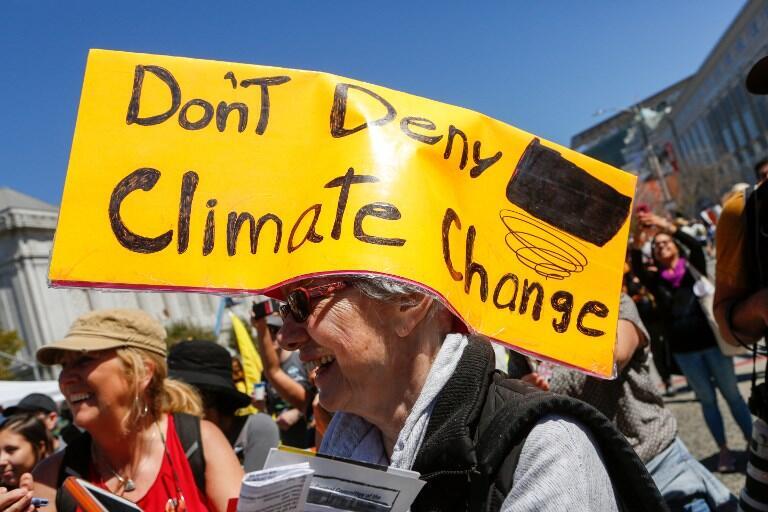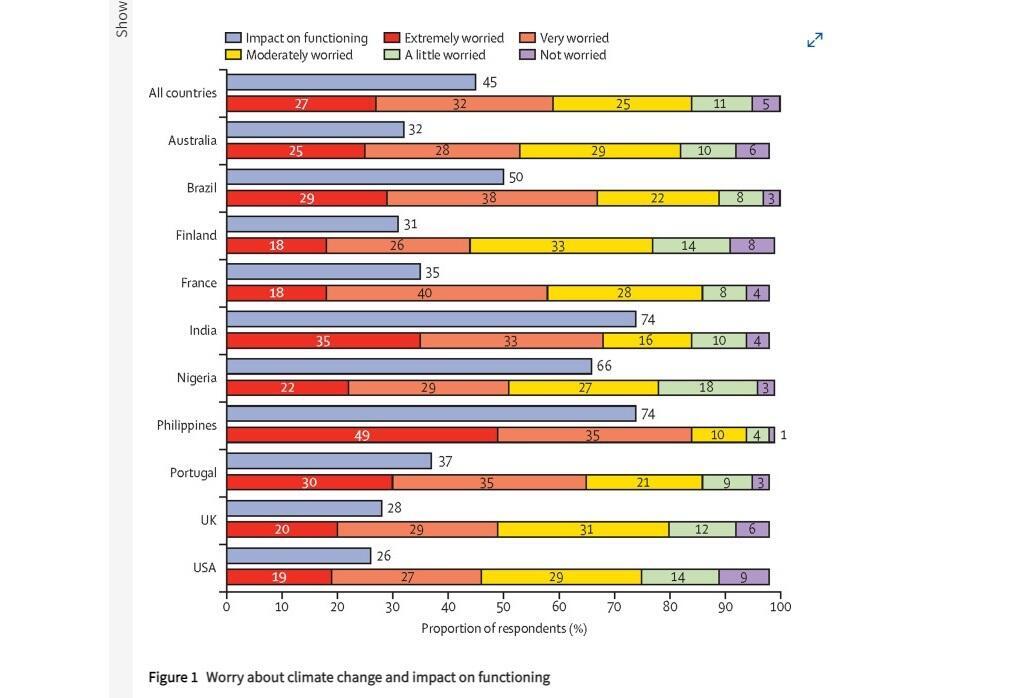COP29 begins its second week in Azerbaijan with, for only the second year, a day dedicated to health in the era of climate change. Physical integrity is at stake for a growing number of populations. Mental health also suffers and ecological anxiety is now the subject of much research. Interview with Hélène Jalin, clinical psychologist and doctoral researcher at the University of Nantes, who has been studying the phenomenon since it really took off, around 2017.
RFI: There is no single shared definition of eco-anxiety. The term is not recognized by the World Health Organization (WHO), even though it appeared in French dictionaries a year ago. How would you define this concept?
Hélène Jalin: It is true that several definitions coexist, quite simply because a certain number of researchers proposed theirs at approximately the same time. But all of them are based on that of an emotion felt in the face of the ecological crisis. Some will expand to emotions other than anxiety, such as anger, guilt, sadness, etc.
Precisely, eco-anxiety refers to a fairly broad spectrum of emotions, to the point that the concept is sometimes described as a bit of a catch-all.
This is explained, for psychology, by the fact that we are chasing a phenomenon which existed before psychologists became interested in it. This term emerged in 2017, when the American Psychological Association published a report on the psychological impacts of the environmental crisis. It has since been democratized. But it is not yet in the DSM [le Manuel de diagnostic et statistique des troubles mentaux, NDLR]there ” Bible » psychologists, because its criteria have not yet been sufficiently characterized to achieve consensus within the scientific community.
How does this emotion, or this set of emotions, translate into everyday life?
There is a lot of anger and incomprehension that manifests itself among eco-anxious subjects: they do not understand why we cannot collectively face the threat of climate change. The work on eco-anxiety shows that the majority of these people were not originally anxious. It differs from usual forms of anxiety because it is a form of rational anxiety. On the other hand, the symptoms are common.
My research team developed a “ eco-anxiety scale », Emea, for use by psychologists – which has been proofread and accepted by peers and will soon be published. It has three subscales. The first assesses physical emotional symptoms: difficulty falling asleep, nightmares, muscular tension, loss of appetite, etc. The second focuses on relational difficulties: this is one of the main subjects of complaints from eco-friendly people. anxious people who may be surrounded by people who are not as aware of the climate crisis as they are. When your parents or your partner systematically take you by plane on vacation, for example, this can create conflict. Eco-anxiety can also generate crises of meaning at work.
We called the third subscale “ ecological obsession » which results in a bulimia of information: we only think about that, we only talk about that, we will continue to consume information that is harmful to us and the more we inform ourselves, the more we is stressed and the more we want to be informed. Which can prevent us from working or concentrating.
These symptoms can be considered pathological, depending on the degree of severity.
Also readSadness, anger…: what are the symptoms of eco-anxiety?
Indeed, research is moving towards another reading of eco-anxiety. Inserm, for example, recommends “ do not pathologize eco-anxiety », and specifies that it is not a mental illness.
Eco-anxiety is not an illness, it is an emotional response associated with real danger. This anxiety manifests itself in people who have integrated the reality of the climate crisis on an emotional level. Which is not the case for the majority of people. They realized that part of the planet will become unsuitable for human life with a range of consequences (migration, wars, famines, diseases, etc.). They worry about themselves and their children’s future. When all this ends up speaking to the emotional brain, it triggers things that will be very difficult to accept because we are talking about a serious civilizational crisis.
Eco-anxiety goes beyond simple worry about an issue. Some people will have more difficulty than others in handling the stress of this realization. They will then develop pathological forms, such as a feeling of helplessness which can lead to forms of depression or, on the contrary, the will to act which can lead to exhaustion in associative and militant commitment. But indeed, and fortunately, not all forms of eco-anxiety are pathological, otherwise there would really be a large part of the population in a pathological state.
Treating eco-anxiety as a disease implies that it’s eco-anxious people who have a problem, when they have a good reason to be. It’s ultimately quite political to say that it’s the eco-anxious who have a problem and not those who don’t worry! This reflects the current functioning of our society: we generally live in a sort of denial and this is changing far too little to reverse the trend.
Eco-anxiety would therefore be more of a driving force for action, and the answers would be to be sought not in the medical world, but in collective and political action. ?
All research on the subject shows that those who are aware of the phenomenon are more likely to act. They are often compared to canaries in the mine, warning messengers who will allow us to react quickly and collectively and avoid disaster. For me, the eco-anxious are those who have sufficient foundations to emotionally cope with something that the majority of people cannot cope with. Most people accommodate the climate crisis, this fact, this concept, these numbers only in their rational brain.
We don’t have an emotional brain wired for that. It is wired to respond to environmental changes which are brutal, which occur in the present, in the face of injustice or complicated human relationships for example, but not to anticipate a medium to long term threat, which does not is not present in our daily lives. When the emotional brain intervenes, it is to tell us “ we will be asked to change, we will lose quality of life, we will lose our car “. We become eco-anxious when we realize that we have much more to lose from the environmental crisis.
To listen againIt’s not wind: eco-anxious, this show will save you

There is an assertion that comes up very often: the media and scientists are a powerful vector of eco-anxiety by reporting facts and disasters attributed to climate change. Is this the case?
But it is their role to alert the world so that there is finally a collective reaction! Once again, eco-anxiety must be understood as a completely rational worry. When we see the scientific projections of the IPCC and the future scenarios for humanity, we are onto something extremely serious. Watch Valencia and other extreme weather events today. And what will push people to act are emotions, not conceptual knowledge of the problem. The more eco-anxious people there are, the better for the future of the planet. So let the media continue like this! We need to worry people, but also give them reasons to hope and get moving. If we stress people out, without giving them the means to take action, they will only have one psychological interest: to retreat into denial.
What are the remedies then?
You have to learn to live with your eco-anxiety, you can’t solve it. This is actually my situation: I went through complicated phases and now I manage to live with them. But I know that from time to time, my eco-anxiety will come out and that I will have to manage it until no solution is found to the crisis. HAS the occasion of the election of Donald TrumpI completely cut myself off from the media for a week because I knew it would generate too much anxiety for me. So, sometimes with the help of a therapist, we learn to better regulate this anxiety, which is healthy and normal, and to diversify strategies to do good for ourselves and reduce the emotional level which can be too complicated to live with for some. .
Eco-anxiety is a driver of action, often when associated with anger. So there are a lot of eco-anxious people among activists. Acting collectively can be key. It is very different to choose to become vegetarian on your own scale than to campaign for your child’s canteen to become vegetarian at least one day a week.
Also read“From eco-anxiety to action”, scientists rebel
In 2023, eight out of ten French people said they were worried about climate change. It’s huge. However, does this encourage this same proportion of people to change their habits to alleviate this concern? There are not eight out of ten French people who call themselves environmentalists…
To answer “ No » to the question « Are you worried about climate change? “, we still have to accept it. Most people will answer that they are worried in principle, by what in psychology is called ” social desirability “, or in the sense that will be most appreciated by the interlocutor. This will not necessarily work on them daily.
Is this an anxiety characteristic of Western countries?
No not at all. A study of Lancet of 2021, which interviewed 10,000 young people aged 16 to 25 in ten different countries, demonstrated this. THE Philippines have the highest level of anxiety among young people, followed by India. Finally, we find the UNITED STATES or the France. It is rather in countries that experience extreme climatic events, such as typhoons or heatwaves, that eco-anxiety will be more marked.

